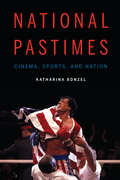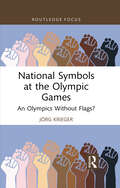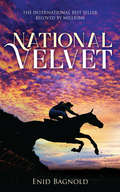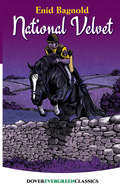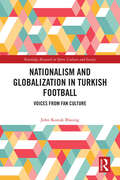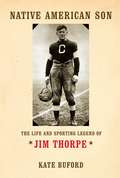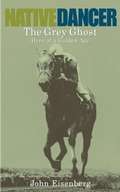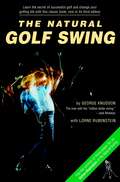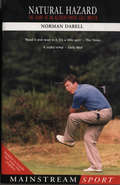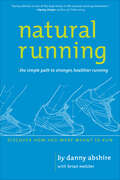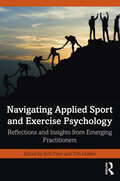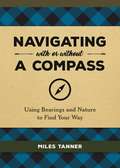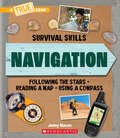- Table View
- List View
National Pastimes: Cinema, Sports, and Nation (Sports, Media, and Society)
by Katharina BonzelSports have long fascinated filmmakers from Hollywood and beyond, from Bend It Like Beckham to Chariots of Fire to Rocky. Though sports films are diverse in their approach, style, and storytelling modes, National Pastimes discloses the common emotional and visual cues that belie each sports film&’s underlying nationalistic impulses. Katharina Bonzel unravels the delicate matrix of national identity, sports, and emotion through the lens of popular sports films in comparative national contexts, demonstrating in the process how popular culture provides a powerful vehicle for the development and maintenance of identities of place across a range of national cinemas. As films reflect the ways in which myths of nation and national belonging change over time, they are implicated in important historical moments, from Cold War America to the class dynamics of 1980s Thatcherite Britain to the fragmented sense of nation in post-unification Germany. Bonzel shows how sports films provide a means for renegotiating the boundaries of national identity in an accessible, engaging form. National Pastimes opens up new ways of understanding how films appeal to the emotions, using myth-like constructions of the past to cultivate spectators&’ engagement with historical events.
National Symbols at the Olympic Games: An Olympics Without Flags? (Routledge Focus on Sport, Culture and Society)
by Jörg KriegerThis provocative book makes the case for the complete removal of national symbolism in the Olympic Games. Focusing on the case of national flags at the Olympic Games, it explores the history of national symbols at the Olympics and asks what this issue can tell us about the politicisation of sport in the twenty-first century.Drawing on multi-disciplinary research from history, political science and sociology, and exploring the link between historical processes and the experiences of individuals, the book attempts to deconstruct the global sport system and its traditions. It argues that the history of flags is essentially the history of nationalism itself, impacted by power interests, and by exploring the lesser-known Olympic histories of athletes such as American boxer Oscar De La Hoya or those from the Faroe Islands, the book explores the complex links between national symbolism and international sport. It concludes with a controversial set of proposals for breaking those links, including a new tradition that would symbolically ‘lock up’ national flags as part of the opening ceremony of Olympic Games.Thought-provoking and concise, this book is fascinating reading for anybody with an interest in the politics, sociology, history or governance of sport, or in nationalism, international organisations or the history of protest.
National Team: The Inside Story of the Women Who Changed Soccer
by Caitlin MurrayThe U.S. Women’s National Soccer Team has won four World Cups and four Olympic gold medals, set record TV ratings, drawn massive crowds, earned huge revenues for FIFA and U.S. Soccer, and helped to redefine the place of women in sports. But despite their dominance, and their rosters of superstar players, they’ve endured striking inequality: low pay, poor playing conditions, and limited opportunities to play in professional leagues. <P><P> The National Team, from leading soccer journalist Caitlin Murray, tells the history of the USWNT in full, from their formation in the 1980s through the 2019 World Cup, chronicling both their athletic triumphs and less visible challenges off the pitch. Murray also recounts the rise and fall of U.S. professional leagues, including the burgeoning National Women’s Soccer League, an essential part of the women’s game. <P><P> Through nearly 100 exclusive interviews with players, coaches, and team officials, including Alex Morgan, Carli Lloyd, Hope Solo, Heather O’Reilly, Julie Foudy, Brandi Chastain, Pia Sundhage, Tom Sermanni, and Sunil Gulati, Murray takes readers inside the locker rooms and board rooms in engrossing detail. Fully updated and expanded to include the team's dominant victory in France in 2019, The National Team is a story of endurance and determination, a complete portrait of this beloved and important team.
National Velvet (Dover Children's Evergreen Classics Ser.)
by Enid Bagnold"Put on your not-to-be-missed list." — The New YorkerHer mother calls it "a breathtaking piece of folly," but fourteen-year-old Velvet Brown is determined: every night she prays to be the best rider in England, and every day she trains to win the world's most famous steeplechase, the Grand National. No woman has ever competed in the race, let alone won it. Velvet is skinny and frail, and her mount is a rough country horse that she won in a raffle. But she whispers her hopes and dreams into his ear, and the horse flies over fences at her command.Generations of readers of all ages have thrilled to the tale of Velvet's grit and determination and its inspiring example of the struggles and rewards of following a dream. A richly atmospheric portrait of rural life between the World Wars, National Velvet was a selection of the Book-of-the-Month Club in the United States and the Book Society in England upon its 1935 debut. It also served as the basis for the popular movie starring Elizabeth Taylor and Mickey Rooney. This charming new edition features the original drawings by Laurion Jones, the author's thirteen-year-old daughter."The book is one that horse lovers of every age cannot fail to enjoy." — The New York Times"Humorous, charming, National Velvet is a little masterpiece." — Time"This book deserves a top place on your shelf." — Christian Science Monitor
National Velvet (Dover Children's Evergreen Classics)
by Enid Bagnold"The book is one that horse lovers of every age cannot fail to enjoy." — The New York Times "Humorous, charming, National Velvet is a little masterpiece." — Time "Put on your not-to-be-missed list." — The New Yorker A butcher's daughter in a small Sussex town ends her nightly prayers with "Oh, God, give me horses, give me horses! Let me be the best rider in England!" The answer to fourteen-year-old Velvet Brown's plea materializes in the form of an unwanted piebald, raffled off in a village lottery, who turns out to be adept at jumping fences—exactly the sort of horse that could win the world's most famous steeplechase, the Grand National. Richly atmospheric of rural English life between the World Wars, National Velvet has enchanted generations of readers since its 1935 debut. The heroine's grit and determination, backed by the support of her eccentric and loving family, offer an inspiring example of the struggles and rewards of following a dream.
Nationalism and Globalization in Turkish Football: Voices from Fan Culture (Routledge Research in Sport, Culture and Society)
by John Konuk BlasingTelling an important story about the development of modern Turkey, this fascinating book examines the place of football in Turkish society and the relationship between Turkish sport, nationalism, and globalization.Drawing on original ethnographic research with Turkish football fans, as well as players and coaches, the book argues that Turkish sport, particularly football, has played an important role in Turkish modernity, offering another way to mark Turkish national identity. At the same time, as football has become part and parcel of the global culture industry, the inclusive aspect of Turkish sport is threatened by the trend to commodification and mediatization, as football has become less of a national project and more of a global project increasingly intertwined with the global economy.Blending history, sociology, political science, and cultural analysis, this book is important reading for anybody with an interest in football, fandom, nationalism, modernity, Middle Eastern or European studies, or the relationship between sport and wider society.
Native American Son: The Life and Sporting Legend of Jim Thorpe
by Kate BufordThe first comprehensive biography of the legendary figure who defined excellence in American sports: Jim Thorpe, arguably the greatest all-around athlete the United States has ever seen.With clarity and a fine eye for detail, Kate Buford traces the pivotal moments of Thorpe's incomparable career: growing up in the tumultuous Indian Territory of Oklahoma; leading the Carlisle Indian Industrial School football team, coached by the renowned "Pop" Warner, to victories against the country's finest college teams; winning gold medals in the 1912 Olympics pentathlon and decathlon; defining the burgeoning sport of professional football and helping to create what would become the National Football League; and playing long, often successful--and previously unexamined--years in professional baseball.But, at the same time, Buford vividly depicts the difficulties Thorpe faced as a Native American--and a Native American celebrity at that--early in the twentieth century. We also see the infamous loss of his Olympic medals, stripped from him because he had previously played professional baseball, an event that would haunt Thorpe for the rest of his life. We see his struggles with alcoholism and personal misfortune, losing his first child and moving from one failed marriage to the next, coming to distrust many of the hands extended to him. Finally, we learn the details of his vigorous advocacy for Native American rights while he chased a Hollywood career, and the truth behind the supposed reinstatement of his Olympic record in 1982. Here is the story--long overdue and brilliantly told--of a complex, iconoclastic, profoundly talented man whose life encompassed both tragic limitations and truly extraordinary achievements.From the Hardcover edition.
Native American Survival Skills: How To Make Primitive Tools And Crafts From Natural Materials
by W. Ben HuntW. Ben Hunt, whose Sioux name was Tasunka Witko, traveled throughout the Midwest, living with several Native American tribes, finally settling near the site of the last Sioux uprising. Here he provides step-by-step instructions and exact dimensions to make Sioux ghost shirts, Plains Indian shields, box traps, Iniut snowshoes, and more. From making rawhide to putting the finishing touches on a pair of moccasins, beginners and seasoned woodsmen alike will enjoy making the tools and camp equipment that were used for centuries. Native American Survival Skills is a remarkable source of information about the Americans who first pioneered self-sufficient living. In it, there are lessons for all of us today.
Native Americans and Sport in North America: Other People's Games (Sport in the Global Society)
by C. Richard KingTaking examples from the United States and Canada, this comprehensive text offers compassionate and critical accounts of the Native American sporting experience. It challenges popular images of indigenous athletes and athletics; it explores Native American participation in and appropriation of EuroAmerican sports; and it unpacks social categories,
Native Dancer (Thoroughbred Legends #7)
by Eva Jolene BoydKnown as "The Gray Ghost" because of his color and his amazing ability on the racetrack, Native Dancer won all but one of his 22 starts. His lone loss came in the 1953 Kentucky Derby, when he was upset by Dark Star. Native Dancer went on to win the Preakness and Belmont Stakes. But his brilliance was evident even at two, when he won all nine of his starts and was named co-Horse of the Year, an honor not bestowed on a two-year-old horse again until 20 years later, when Secretariat was named Horse of the Year in 1972.
Native Dancer: The Grey Ghost Hero of a Golden Age
by John EisenbergIn the early 1950s, a rising star flickered across millions of black-and-white TV sets. Nick-named 'The Grey Ghost,' Native Dancer was a blue-blood thoroughbred with a taste for drama, courtesy of his come-from-behind running style, and impressive credits: He finished first in 21 of his 22 career starts, his only loss by a nose in the 1953 Kentucky Derby; was named Horse of the Year-twice; and was inducted into the National Museum of Racing's Hall of Fame. His popularity was so great, Time® magazine put him on its cover, and TV Guide named him one of America's top three TV stars, along with Ed Sullivan and Arthur Godfrey. Legend says his ghost haunts Churchill Downs. Set against the nostalgic events of an America long past, NATIVE DANCER is the definitive account of one of the greatest champions of horse racing's golden age.
Natural Golf Swing
by George KnudsonIf your golf game has been plagued by inconsistency and less-than-peak performance, you may be going against your "natural swing". But you can improve your golf game dramatically and you can beat bad habits by drawing on talents you already possess. The Natural Golf Swing will: * introduce you to your natural balance and rhythm* let you play consistently to your potential* allow you to enjoy a repeating swing* help you increase power and control with every swingAccording to champion golfer George Knudson, your swing is governed by laws of nature, and is subject to logical, physical fundamentals that are all too often ignored. By learning the simple principles outlined in this book, you will generate more powerful, accurate swings, reduce your score, and gain control over your game. Take advantage of Knudson's more than 30 years experience on the pro circuit as he guides you step-by-step through the mechanics of the natural swing, from the important first step of maintaining proper balance,through the backswing, down-swing, and finishing form. Extensive illustrations and drills help to clarify each step. Knudsen also shares his experience as a golfer on the tour, offering valuable insights into the roles that temperament and concentration play in winning.
Natural Hazard: The Diary of an Accident-Prone Golf Watcher
by Norman DabellNorman Dabell, journalist, broadcaster and notorious jinx, has been covering the European golf circuit for over 20 years, though after reading this hilarious account of his mishaps, you may well come to wonder how he has managed to survive for so long.Join Norman as he retraces his pursuit of the travelling circus of the golf world from St Andrews to Sun City, Malaga to Morocco, encountering all the great faces of the modern game. Woods, Ballesteros, Faldo, Montgomerie, Westwood, Lyle, Woosnam, Langer, Olazabal, Garcia... they have all made the headlines. Dabell is there to make sure they do - while also trying to survive another day. Golf isn't really meant to be fun, they say, and sometimes it can be toture. But Danbell's rib-tickling (and his have been more than tickled) account will have even the most serious enthusiast in stitches. Fate has caused him many a tumble, broken bone and on-air gaffe, and Dabell's presence inside the ropes has been known to make even the toughest tour professional blanche. However, he is a favourite of Major-winner Vijay Singh, who might have never have got his career on the road if his ball had plummeted out of bounds instead of ricocheting onto the fairway off Dabell's head in Spain in 1990. Singh made a birdie instead of a possible double-bogey, won the tournament and ten years later went on to beat the world at Augusta. Just one of a thousand escapades which happened to a living, breathing Natural Hazard.
Natural History of the Pacific Northwest Mountains: Timber Press Field Guide (A Timber Press Field Guide)
by Daniel MathewsNatural History of the Pacific Northwest Mountains is an engagingly written, portable history and identification guide for the flora, fauna, and geology of the region. This guide also includes information about the landscape and weather. Packed with 800 color photographs, this is the perfect overview of the Pacific Northwest if you are looking for a simple way to discover the great outdoors.
Natural Running: The Simple Path to Stronger, Healthier Running
by Brian Metzler Danny AbshireNatural Running is the middle ground runners have been looking for. By learning to run the barefoot way, while wearing shoes, runners will become more efficient, stronger, and healthier runners. Backed by studies at MIT and Harvard, running form and injury expert Danny Abshire presents the natural running technique, form drills, and an 8-week transition plan that will put runners on the path to faster, more efficient, and healthier running.In Natural Running, Abshire explains how modern running shoes distort the efficient running technique that humans evolved over thousands of years. He reviews the history of running shoes and injuries, making the case for barefoot running but also warning about its dangers. By learning the natural running technique, runners can enjoy both worlds: comfortable feet, knees, and legs and an efficient running form that reduces impact and injuries.Natural Running teaches runners to think about injuries as symptoms of poor running form. Abshire specifies the overuse injuries that are most commonly associated with particular body alignment problems, foot types, and form flaws. Runners will learn how to analyze and identify their own characteristics so they can start down the path to natural running.Abshire explains the natural running technique, describing the posture, arm carriage, cadence, and land-lever-lift foot positioning that mimic the barefoot running style. Using Abshire’s 8-week transition plan and a tool kit of strength and form drills, runners will move from heel striking to a midfoot or forefoot strike.Natural Running is the newest way to run and also the oldest. By discovering how they were meant to run, runners will become more efficient, stronger, and healthier runners.
Nature and Health: Physical Activity in Nature (Routledge Research in Health, Nature and the Environment)
by Eric Brymer Jo Barton Mike RogersonExperiences in nature are now recognised as being fundamental to human health and well-being. Physical activity in nature has been posited as an important well-being facilitator because the presence of nature augments the benefits of physical activity while also enhancing motivation and adherence. This volume brings together a mix of cutting edge ideas in research, theory and practice from a wide set of disciplines with the purpose of exploring interdisciplinary or trans-disciplinary approaches to understanding the relationship between physical activity in nature and health and well-being. Nature and Health: Physical Activity in Nature is structured to facilitate ease of use for the researcher, policy maker, practitioner or theorist. Section 1 covers research on physical activity in nature for a number of important health and well-being issues. Each chapter in this section considers how policy and practice might be shaped by current research findings and knowledge. Section 2 considers contemporary theoretical and conceptual understandings that help explain how physical activity in nature enhances health and well-being and also how best to design interventions and research. Section 3 provides examples of current approaches. This book is an ideal resource for both researchers and advanced students interested in designing future-proofed research, for policy makers interested in improving community well-being and for practitioners interested in best practice applications.
Nature, Nurture and Horses
by Paul BelasikFollow along as four young horses—Corsana, Kara, Elsa, and Escarpa—leave their babyhood behind and begin their training for future careers as sport horses, well schooled in the art of classical dressage.Renowned rider, trainer, author, and equestrian philosopher Paul Belasik shares the daily schedule, weekly events, and his own musings over each horse's character, physicality, athletic ability, and training as the months and seasons pass. Belasik's honest and enlightened journal entries give the reader an inside look at training horses according to the classical system he has used for almost 40 years. His style of writing allows the reader to &“live&” the experiences as he did —
Naturerleben und Reflexion: Eine qualitative Untersuchung zur Erforschung von Naturerfahrungen Jugendlicher im schulischen Kontext
by Katharina FrüchtnichtKatharina Früchtnicht untersucht auf Grundlage von Kleingruppendiskussionen mit Jugendlichen die Bedeutung von Natur und Erlebnissen in der Natur, die Jugendliche diesen beimessen. Zudem wird eine auf Reflexion abzielende Versprachlichung von Erlebnissen in der Natur sowie deren Bedeutung für die Erfahrungsprozesse der Jugendlichen analysiert. Für eine theoretische Klärung des Begriffs ‚Naturerfahrung‘ und der Schärfung eines Reflexionsverständnisses bezieht sich die Arbeit auf den Erfahrungsbegriff von John Dewey sowie auf den didaktischen Ansatz der Alltagsphantasien. Ausgehend von den Ergebnissen der Analyse plädiert die Arbeit für eine pädagogische Praxis, die den Jugendlichen in ihrem Erleben in der Natur ein hohes Maß an Freiheit und Selbstbestimmtheit ermöglicht und gleichzeitig angeleitete Reflexionsanlässe bietet.
Naughty Christmas Nights
by Tawny WeberThis Christmas, it's nice vs. naughty... Lace stockings... Hailey North has worked her butt off to make Merry Widow Lingerie a success. But if she doesn't win the bid for Rudolph's department store, she's in big trouble. Her strategy? To prove that romance, playfulness and eroticism are what women want. The problem, however, is what Hailey wants...her wickedly hot, sexy competitor. Or black leather? Sex sells, and the Milano line is certainly all about sex. Besides, winning is the only way Gage Milano can extract himself from the family business. Unfortunately, Hailey's romantic lingerie threatens not only his freedom, but his libido! But when their professional rivalry turns into a red-hot rendezvous, the competition really starts heating up. And Xmas is about to get a whole lot more X-rated!
Navigating Applied Sport and Exercise Psychology: Reflections and Insights from Emerging Practitioners
by Tim Holder Erin PriorIn recent years, more students have chosen to study sport and exercise psychology with a view to building careers as applied practitioners. While sport and exercise psychology master’s graduates leave university with the necessary theoretical knowledge to inform their practice, they are often left wanting to know more about creating and navigating a career within the field. Navigating Applied Sport and Exercise Psychology provides readers with an honest and contemporary insight into the work and experiences of trainees and early career practitioners. This book delves further into the more complex and nuanced experiences of being an applied practitioner. Using case studies and reflections, the chapters explore key topics including working within multi-disciplinary teams, maintaining ethics and integral practice during challenging conversations and supporting mental health in high-performance environments. Written by trainees and early career practitioners, this book is vital reading for students, early career practitioners, and anyone interested in sport psychology. Erin Prior is a BPS Chartered, HCPC registered Sport and Exercise Psychologist. As an applied practitioner, Erin works with a range of individuals, teams, and organisations across various sports. Alongside her applied practice, Erin is completing her PhD which is focused on athlete mental health, at Loughborough University. Tim Holder, PhD, is an HCPC Registered Sport and Exercise Psychologist, BPS Chartered and a BASES Fellow. He is an applied sport psychology consultant and supervisor to students working towards practitioner status in the UK. Tim is the Programme Leader for the MSc in Applied Sport Psychology at the University of Winchester, UK.
Navigating With or Without a Compass: Using Bearings and Nature to Find Your Way
by Miles TannerNever be lost again! This concise and handy guide will help you get your bearings and find your way out of the wilderness no matter your equipment. Finding your campsite, a spectacular view, or your way home can be difficult, especially when your phone or GPS malfunctions. But knowing how to use a magnetized compass, paper map, and the positions of the sun, moon, stars, and other practical aids in pathfinding will help outdoorsman find their way in almost any kind of terrain. Navigating With or Without a Compass will teach you the basics of using that essential tool, such as the difference between true north and magnetic north based on where you are and using compass bearings from a map and in the field to determine location. However if you find yourself without a compass, this handy guide will also give you natural signs and guideposts for pathfinding, such as the way the wind blows, trees grow, or flowers bloom. Also covered will be determining direction through reading the Sun and the shadows it forms, the position and stages of the Moon, and familiarizing oneself with the principal constellations to guide you and determine the time at night. Perfect for the skilled woodsman or just a walk in the woods, Navigating With or Without a Compass is filled with tips and essential knowledge indispensible for hikers, campers, scouts and nature lovers.
Navigation (A True Book (Relaunch))
by Jenny MasonLearn basic survival skills and connect with nature!Knowing how to navigate – whether it’s by using a compass or by using objects found in nature — is a skill that every outdoor adventurer needs. Did you know that you can make a compass out of sticks and rocks? Or that you can use the stars as a guide? Learn all this and more in Navigation — a book that gives kids the confidence they need to get outside and explore.ABOUT THE SERIES:Learning basic survival skills will give every kid the confidence — and the know-how — to handle emergencies and extreme situations. It also helps them feel comfortable and secure when they’re connecting with the outdoors while hiking, backpacking, or simply exploring the woods. The books in the Survival Skills series teach kids how to build a shelter from found materials, how to navigate (even without a compass), how to treat injuries in case of emergency, and so much more. These essential skills will give them the tools to take care of themselves in any situation.
Navigation Rules and Regulations Handbook: Full Color 2021 Edition
by U.S. Coast GuardNOW IN FULL COLOR! From the United States Department of Transportation and the United States Coast Guard, the official, legally required handbook for every boat owner—covering safety, collision avoidance, towing and pushing, and more.Navigation Rules and Regulations fulfills the legal requirement to have a copy of these guidelines on your vessel at all times. Updated to accommodate the most recent changes to marine law and standard operating procedure, this handbook provides the Coast Guard's official rules for operating your boat in international and domestic waters. It will serve as a complete reference for:Steering and sailing in all levels of visibility, including how to avoid collisionsConduct when another boat is in sight, including navigating in head-on and crossing situationsRequirements for flags, shapes, and lights, and how to identify other vesselsSending and receiving sound and light signals from other ships, such as distress signalsThe Inland General Rules included in this handbook require that "the operator of each self-propelled vessel 12 meters or more in length shall carry, on board and maintain for ready reference, a copy of these Rules." Operate your vessel safely and legally with the latest Navigation Rules and Regulations Handbook.
Navigation Rules and Regulations Handbook: International—Inland
by Us Coast GuardThe official and legally required handbook for every boat owner. Navigation Rules and Regulations fulfills the legal requirement to have a copy of these guidelines on your vessel at all times. Newly updated to accommodate the most recent changes to marine law and standard operating procedure, this handbook provides the Coast Guard's official rules for operating your boat in international and domestic waters. It will serve as a complete reference for: Steering and sailing in all levels of visibility, including how to avoiding collisions Conduct when another boat is in sight, including navigating in head-on and crossing situations Requirements for flags, shapes, and lights, and how to identify other vessels Sending and receiving sound and light signals from other ships, such as distress signals The Inland General Rules included in this handbook require that "the operator of each self-propelled vessel 12 meters or more in length shall carry, on board and maintain for ready reference, a copy of these Rules." Operate your vessel safely and legally with the latest Navigation Rules and Regulations Handbook.
Navigation Rules: International—Inland
by U.S. Coast GuardFor anyone who owns a boat, this is the handbook you need to own. Included are all of the official government rules and regulations that must be followed by anyone out on the water. This book will prepare you for head-on situations, avoiding collisions, using, distress signals, and will inform you of all the up-to-date water regulations. Whether you're in a jam or just relaxing at sea, Navigation Rules will teach and prepare you for anything and everything you may encounter while on your boat.
